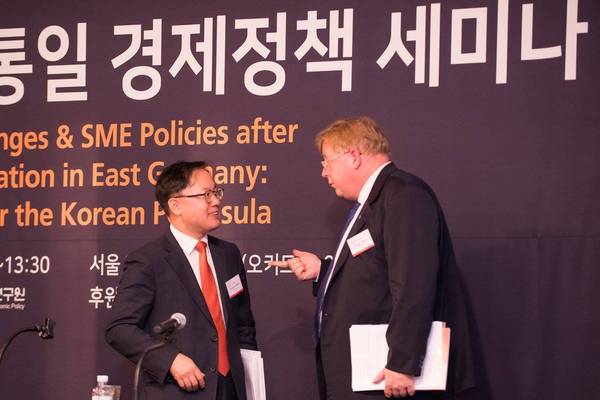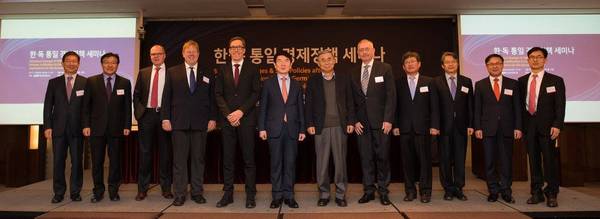Research-Conference
Unification in Germany: Implications for Korea
Dr. Seliger (HSF) talking with Dr. Jeong Hyung-gon, Vice President of KIEP
In 2014, the German and Korean finance ministries founded the so-called "Korean-German economic research network on Unification" together with the Korean Institute for International Economic Policy (KIEP) and the Halle Institute for Economic Research (IW Halle). In December, the research network met to discuss structural changes and SME (small and medium enterprises) policies in Germany after unification and implications for Korea.
The conference was opened by President Hyun Jung-taik of the KIEP, who stressed the fruitful cooperation of both sides. Park Il-Young, Deputy Director in the Ministry of Strategy and Finance, as well as Stefan Olbermann, Head of the divisions for macroeconomic country analysis and bilateral relations, welcomed participants in the name of the two finance ministries. In a special lecture Lee Jong-Seok, former Minister of Unification, warned that any hope of collapse of North Korea were premature and rather policies should focus on economic revitalization. North Korea is already carrying out certain economic reforms directing it more towards a market economy.
In the first session, moderated by Dr. Yoon Deok-ryong of KIEP, two presentations looked into privatization and regional disparities in unified Germany.
Speakers and discussants of the conference of KIEP
Dr. Gerhard Heimpold, Deputy head of the Department of Structural Change and Productivity at the IW Halle, looked into "Decision making by the Treuhandanstalt on privatization, restructuring or liquidation of former state-owned firms in East Germany". Dr. Jeong Hyung-gon, Vice President of KIEP and main researcher in the joint research of KIEP and IW Halle, presented a paper on "Regional Economic Growth of East German States after German Unification and its Policy Implications for Korea". The papers were discussed by Kim Byung-yeon, professor at Seoul National University, and Dr. Bernhard Seliger, Representative of Hanns Seidel Foundation in Korea. In his discussion Dr. Seliger focused on potential regional policies for North Korea in the case of opening or unification, which would gradually shift from policies for the whole area to more differentiated policies.
The second session focused on the role of SME (small and medium enterprises), moderated by Jeong Hyung-gon, Vice President of KIEP. Dr. Jörg Zeuner, Chief Economist of the German development bank Kreditanstalt für Wiederaufbau, looked into the support for SME in East Germany after German unification. All in all, he concluded, policies to strengthen and rebuild the SME sector in East Germany were successful. A functioning banking system was among the facilitating factor for successful policy interventions in this area in East Germany. Dr. Kim Yeung-chan, visiting research fellow at the KIEP, talked about the policies to rebuild SME in East Germany and looked into potential implications for Korea. The discussion started with Dr. Kim Kwang-hee, Senior research fellow at Korea Small Business Institute (KOSBI). The second discussant was Stefan Olbermann of the German Federal Ministry of Finance, who discussed still lagging fields of SME in East Germany.
The cooperation of the Korean and German economic research institutes will continue in the future.


